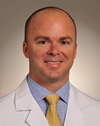In The News
Dr. Andrew Spitzfaden, St. Luke's Hospital

Hip fractures serious: Prevention and proper treatment critical
A hip fracture is a break in the upper part of the femur (thigh) bone and is considered to be the most devastating osteoporosis-related fracture. Osteoporosis is the thinning of bone tissue and loss of bone density over time, and it affects about one in five American women over the age of 50. About half of all women over 50 will have a fracture of the hip , wrist or vertebrae (bones of the spine).
According to a recent study in the Annals of Internal Medicine, hip fractures are associated with a high rate of death - as much as eight times greater during the three months following a hip fracture . For those who survive, hip fractures are associated with prolonged disability and the need for long term medical care.
There are three different types of hip fractures , and most require some sort of surgical correction. Some fractures can be repaired with a rod, plate or screws, while others will require a partial or total hip replacement . Patients are encouraged to get out of bed the day following surgery with the assistance of physical therapy, and the amount of weight a patient can place on the injured leg depends on the type of fracture and fixation.
Women should work with their primary care physician and orthopedic surgeon to determine whether bone density has been reduced and to identify the cause for the reduction. Early treatment of osteoporosis is the most effective way to reduce bone loss and prevent hip fractures . That's because once bone is lost, it is difficult to rebuild.
Building bones through adequate calcium intake and exercise when you are young is a wise investment. Keep in mind that studies have shown smoking and excessive alcohol use can contribute to bone loss. Also, since the leading cause of osteoporosis in women is a drop in estrogen at the time of menopause, ask your physician about medications to prevent menopausal bone loss such as estrogen replacement therapy, calcitonin or other medications currently in development.
Dr. Andrew Spitzfaden specializes in orthopedic surgery and sports medicine at St. Luke's Hospital. Call 314-576-7013 or visit his Physician Referral page.
This article was published in the St. Louis Post-Dispatch on April 8, 2010.
